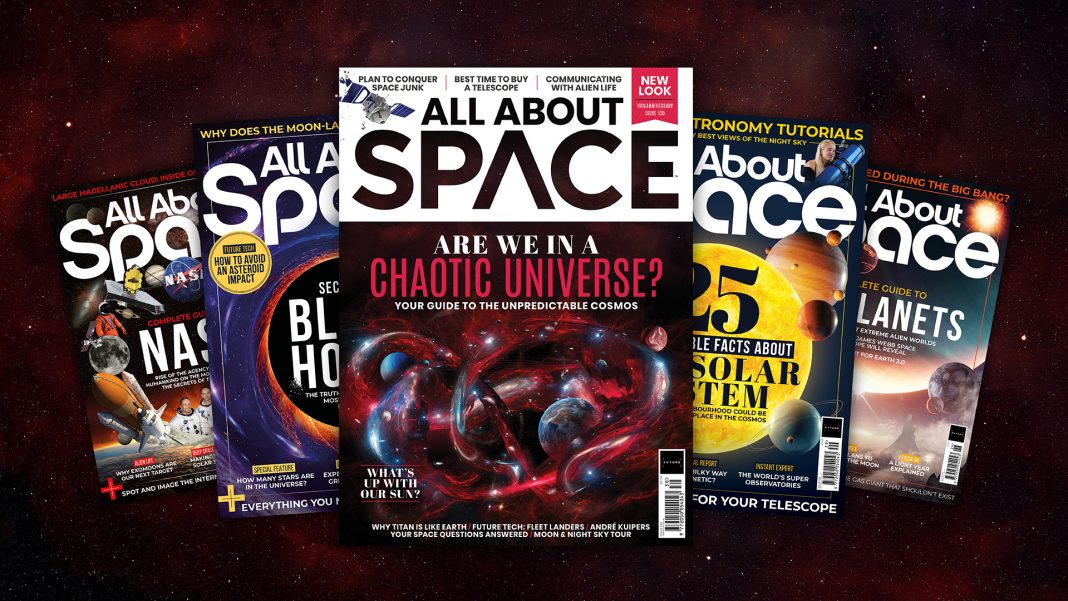Inside All About Space issue 130, on sale now, explore the chaos theory and how it influences the world around us and also applies to the wider universe. Get All About Space delivered straight to your door or digital device. Subscribe to All About Space from $8.50 per quarter/three issues. For this cover feature, All About Space dives into chaos theory and explores how it affects everything around us from traffic jams and stock markets to star formation and the death of planets. Learn about the history of chaos theory and why it’s important for unlocking the secrets of the universe in the latest issue of All About Space. Related: Do parallel universes exist? We might live in a multiverse. Elsewhere in the issue, you can explore five NASA spacecraft that have ended up on interstellar trajectories and learn about their discoveries to date as well as what may be in store for them in the future. The latest issue of All About Space also features an interview with ESA astronaut André Kuipers, who has flown into space twice — the only Dutch astronaut to do so. We also have an in-depth stargazer section filled with useful information on what to look out for in the sky, including naked eye and binocular targets and a deep sky challenge. Take a peek below at All About Space issue 130’s biggest features and check out All About Space’s brand new look! Thanks to a full redesign our sister publication looks more like Space.com than ever before. When it comes to surviving in space, the tiniest things can be the difference between life and death. As Canadian astronaut Chris Hadfield said: “An astronaut who doesn’t sweat the small stuff is a dead astronaut.” That may be the case for human space travel, but astronomers are increasingly suspecting that the same mantra also applies to the wider universe. When it comes to the cosmos, it seems chaos theory is king. Chaos theory traces its origins back to the 19th century. French polymath Henri Poincaré was attempting to win a prize of 2,500 crowns — a third of a professor’s yearly salary — offered up by King Oscar II of Sweden and Norway to celebrate his 60th birthday. To win you had to predict the orbits of the planets. Read the full feature in the latest All About Space . We humans aren’t particularly good at cleaning up after ourselves on Earth , and it turns out we may be even worse when we leave our planet. In over 60 years of space exploration, we’ve rapidly filled Earth’s orbit with junk, and that could become a serious problem in the not-too-distant future. The Soviet satellite Sputnik 1 became our first piece of space junk in October 1957 after it became the first human-made object ever to orbit Earth. By January 1958 its orbit had decayed enough that it re-entered our atmosphere and burned up, never to cause any trouble. But since then we’ve launched thousands of satellites into space, and many of them have been left in Earth orbit even after they have stopped working. Read the full feature in the latest All About Space . Walk carefully over to a fire and you’ll find it gets hotter the closer you get. As you walk away you start to feel cooler again. But if you were to do that at the surface of the sun , the opposite would happen. You’d walk away from the intense heat, start to feel cooler and then suddenly begin to feel hot again. Moving far away from this hot source only puts you in the middle of an even hotter upper atmosphere. Although the sun’s surface burns at a blisteringly hot 10,800 degrees Fahrenheit (6,000 degrees Celsius), the outermost layer of our host star’s atmosphere — which extends thousands of miles above the visible surface — reaches temperatures of around 1.8 to 3.6 million degrees Fahrenheit (1 to 2 million degrees Celsius). It’s a mystery that’s perplexed scientists around the world for decades. Read the full feature in the latest All About Space .
Top Trending
Saturday, July 27, 2024



